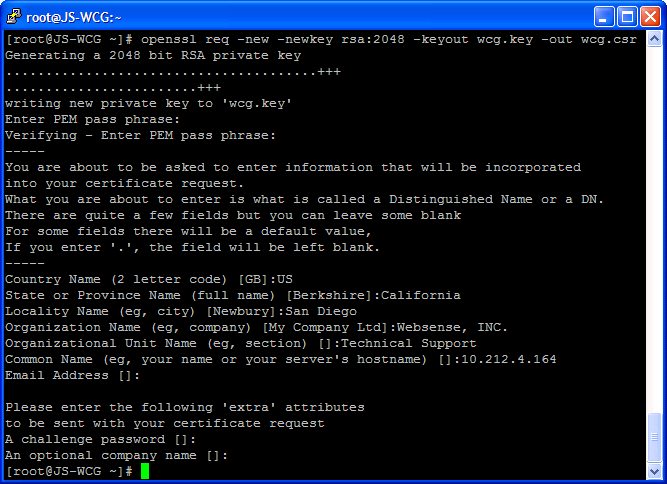Openssl Rsa Key Generation In C
That generates a 2048-bit RSA key pair, encrypts them with a password you provide and writes them to a file. You need to next extract the public key file. You will use this, for instance, on your web server to encrypt content so that it can only be read with the private key. Export the RSA Public Key to a File. This is a command that is. Openssl rsa -in private.pem -outform PEM -pubout -out public.pem. The -pubout flag is really important. Be sure to include it. Jun 23, 2012 Again, RSA is very similar to AES. The major difference being that we’re now using the “Seal” functions. The OpenSSL API differentiates between Seal & Open for encrypting with public keys and decrypting with private keys and Sign & Verify for encrypting with private keys and decrypting with public keys. C Read and use RSA Private key in OpenSSL. Ask Question Asked 5 years, 8 months ago. Active 3 years ago. Viewed 2k times 2. Assume that there's a program which uses OpenSSL RSA for it's security and I have the private key that it uses to decrypt/encrypt it's data. (which can be derived from the RSA private key very easily with OpenSSL. P =337 q = 149 phi = 49728 Encryption key = 8893 k = 7 Private key = 39 (There is another problem here: Encryption and Private keys should be the same. No where in the code have i changed ekey during decryption.) Public key = 39 Modulus = 50213 End Update 4 But i get the same value for Public key and private key. What is the mistake in the.
SYNOPSIS
opensslgenrsa [
DESCRIPTION
The genrsa command generates an RSA private key.

Options
specifies the output file name. If this argument is not specified then standard output is used.
Openssl Rsa Key Generation In Chrome
specifies the output file password source. For more information about the format of arg see the PASS PHRASE ARGUMENTS section in the openssl reference page.
These options encrypt the private key with the DES, triple DES, or the IDEA ciphers respectively before outputting it. If none of these options is specified no encryption is used. If encryption is used a pass phrase is prompted for if it is not supplied via the
the public exponent to use, either 65537 or 3. The default is 65537.
a file or files containing random data used to seed the random number generator, or an EGD socket. Multiple files can be specified separated by a OS-dependent character. The separator is ; for MS-Windows, , for OpenVMS, and : for all others.
the size of the private key to generate in bits. This must be the last option specified. The default is 512.
NOTES
RSA private key generation essentially involves the generation of two prime numbers. When generating a private key various symbols will be output to indicate the progress of the generation. A . represents each number which has passed an initial sieve test, + means a number has passed a single round of the Miller-Rabin primality test. Filemaker pro 14 license key generator. A newline means that the number has passed all the prime tests (the actual number depends on the key size).
Because key generation is a random process the time taken to generate a key may vary somewhat.
BUGS
A quirk of the prime generation algorithm is that it cannot generate small primes. Therefore the number of bits should not be less that 64. For typical private keys this will not matter because for security reasons they will be much larger (typically 1024 bits).
AVAILABILITY
PTC MKS Toolkit for System Administrators
PTC MKS Toolkit for Developers
PTC MKS Toolkit for Interoperability
PTC MKS Toolkit for Professional Developers
PTC MKS Toolkit for Professional Developers 64-Bit Edition
PTC MKS Toolkit for Enterprise Developers
PTC MKS Toolkit for Enterprise Developers 64-Bit Edition
SEE ALSO
- Commands:
- openssl gendsa
PTC MKS Toolkit 10.2 Documentation Build 28.
Chilkat • HOME • Android™ • Classic ASP • C • C++ • C# • Mono C# • .NET Core C# • C# UWP/WinRT • DataFlex • Delphi ActiveX • Delphi DLL • Visual FoxPro • Java • Lianja • MFC • Objective-C • Perl • PHP ActiveX • PHP Extension • PowerBuilder • PowerShell • PureBasic • CkPython • Chilkat2-Python • Ruby • SQL Server • Swift 2 • Swift 3/4 • Tcl • Unicode C • Unicode C++ • Visual Basic 6.0 • VB.NET • VB.NET UWP/WinRT • VBScript • Xojo Plugin • Node.js • Excel • Go
| C++ example code showing how to generate an RSA public/private key.
| |||||
© 2000-2020 Chilkat Software, Inc. All Rights Reserved.